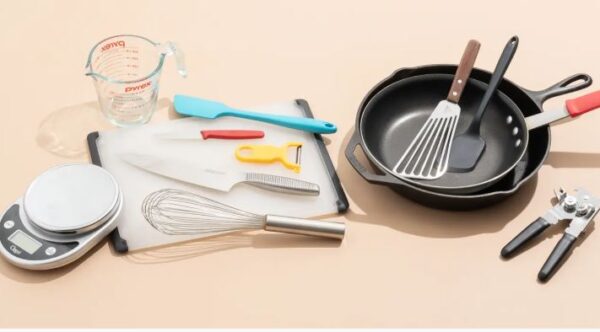
Unpacking a set of shiny new utensils can be an exciting moment, but before you dive into your culinary adventures, there’s a crucial step often overlooked – washing.
While they may appear pristine, new utensils require a thorough rinse before making their debut in your kitchen.
In this article, we explore six compelling reasons why washing new utensils before using them is a non-negotiable practice.
1. Manufacturing residues
During the production process, utensils may accumulate manufacturing residues such as oils, dust, or polishing compounds. Washing removes these remnants, ensuring that your cookware is clean and safe for food preparation.
2. Dust and storage contaminants
From factory to shelf, utensils can accumulate dust and contaminants during transportation and storage. A thorough wash eliminates these external particles, preventing them from mingling with your ingredients during cooking.
3. Removal of protective coatings
Many new utensils come with protective coatings applied to prevent scratches or oxidation during display and storage. Washing helps remove these coatings, ensuring that your cookware is ready for its intended use without any residual substances interfering with your recipes.
4. Safe handling from store to home
Utensils often pass through various hands, from manufacturing to retail shelves. Customers might inspect them, and store staff may handle them during restocking. Washing your new utensils serves as a precautionary step, offering a clean slate and mitigating any concerns about the hygiene of the handling process.
5. Allergen and chemical residues
In mass production facilities, utensils may come into contact with allergens or cleaning chemicals. Washing helps eliminate any potential traces of these substances, safeguarding individuals with allergies and ensuring that your cooking is free from unintended chemical influences.
6. Personal touch
Washing new utensils provides you with a personal touch, allowing you to familiarize yourself with the cookware. It establishes a sense of ownership and ensures that you are in control of the cleanliness standards in your kitchen.
How to do it right?
Now that we understand the importance of washing new utensils, let’s delve into a quick guide on how to perform this ritual effectively:
Step 1: Gather your tools
Dish soap, soft sponge or cloth, and warm water.
Step 2: Rinse first
Give your new utensils a preliminary rinse under running water to remove any loose particles or dust.
Step 3: Apply dish soap
Apply a small amount of mild dish soap to your sponge or cloth. Avoid using abrasive materials that could damage the utensils.
Step 4: Scrub gently
Scrub the utensils gently, paying attention to crevices and handles. This step helps eliminate any manufacturing residues or protective coatings.
Step 5: Rinse thoroughly
Rinse the utensils under warm running water to remove soap and any remaining particles. Ensure that no soap residue is left behind.
Step 6: Dry completely
Pat the utensils dry with a clean towel or allow them to air-dry completely before storing or using them.
Before your new utensils join the symphony of flavours in your kitchen, give them the cleansing they deserve. Washing new utensils isn’t just a hygiene ritual; it’s a declaration of control over your culinary domain, ensuring that every creation starts with a clean canvas. Embrace this practice, and let your cooking adventures unfold on the foundation of cleanliness and safety.

